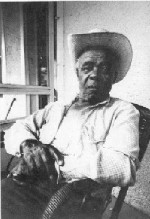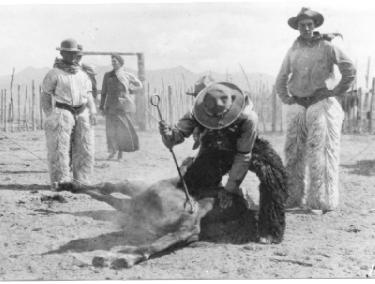HOWARD
HICKSON'S HISTORIES
[Index]
Black Wrangler - Part Two
Reminiscences of Lawrence Jackson
Edited by Howard Hickson
 Photograph
of Lawrence Jackson by Jonas Dovydenas, Lenox, Massachusetts. With
his permission. Photograph
of Lawrence Jackson by Jonas Dovydenas, Lenox, Massachusetts. With
his permission.
GEORGE GILMORE
I looked around and some old guy was watching
me. I spoke, but he never said a word. Just turned and walked away. I went
back to work. Pretty soon, him and another man came back. When they got
closer I saw the other guy was wearing a star. The man with the badge introduced
himself as George Gilmore, the constable.
He told me that this was Dexter (Mine) property
and he was the overseer to see that nobody removed anything from there
without written permission. He wanted to see a permit.
About then, Doc hollered, "What's going on
down there?"
"I might have knowed it was you, Doc." Gilmore
said as he walked up to where Doc was.
They sat and talked for awhile, then the constable
came down, all smiles, and headed back to town.
Doc yelled, "Go ahead, Jack, load up!"
DOC BIT BY A SNAKE
We pulled out the next morning. It was an ill-fated
venture from the start. Right off, Doc was bit by a snake. He was leaning
on a rock, sighting down a wire with a level. I was on the other end and,
when he got the wire level, he told me to tie it. I went over to where
he was and saw the snake on the rock where Doc had his arm.
I got a shovel and killed it, saying, "That
was close. It's a wonder you didn't get bit."
Doc didn't say anything and I thought no more
about it. Later, while I was busy digging a ditch, I began wondering why
things was so quiet. I couldn't hear Doc. I looked down and saw him laying
under the scaffold, flat on his back in the hot sun. I knew for sure then
that the snake had got him.
He was still conscious. Good thing he was.
He told me what to do or he woulda died. I built a fire to heat some water
and got the first aid kit from his suitcase. I soaked some lances in alcohol.
He pulled off his shirt and used the suction cup hisself. He put some kind
of powder in the hot water and it turned purple. He was a real sick man
for a time. I thought I was going to lose him. He laid around for a day
or two, then went back to work.
THE DAM
The local Indians didn't fancy the idea of
damming the creek and neither did some of the stockmen. The biggest squawk
came from the Abel and Certner outfit.
When the dam was nearly finished, we decided
to make a trip to Tuscarora for supplies, especially tobacco. Our horses
had been staying around close to camp. The evening we planned to leave,
we fed them grain. Next morning, they was gone. I could be wrong, but I
will always believe that someone run them off in the night.
There was nothing to do but hotfoot it off
across the desert to Reed's Ranch. We knew better than to try it in the
heat of the day, so we stayed in the shade until sundown, got a sandwich
and a bottle of water each, and walked all night.
While all this walking was going on, somebody dynamited
the dam. Blew it sky high. Some people said it was the Indians, but we
found out later who did it. It was Shorty Riff, foreman of the Abel and
Certner outfit. He hired Dave Bonnie, a hardrock miner, to do the job.
Anyway, about daylight, after walking almost
thirty miles that night, I smelled bacon frying and coffee and knew we
was close by the ranch.
VN RANCH
Johnny Fordine, the boss, was getting ready
to start haying and said he needed another hand at the VN. The blast at
the dam had wiped out my job so I took his offer. Next morning, he told
me to hook a team to the buckboard and take Doc to the stageline, then
take the rest of the day off.
He sent me to Bull Run Basin the next day
to the buckaroo camp where the cowboys was gathering work horses for haying.
He said I could bring the horses back. One of the hands, Bill Corbell,
had a horse he wanted to sell for $100. I told him all I had was $65. He
took it.

Branding at the Spanish Ranch, about 1925. Photo
courtesy of the Northeastern Nevada Museum, Elko.
SHOOTING AT THE RANCH
When I got back to the ranch, a new waddy,
Frank Weaver, and his wife had arrived. She did the ranch cooking and kept
a neat house. From the start I knew that the boss and the new hand would
never get along. The boss, Johnny Fordine, said that a white man that can't
get anything but a squaw for a women can't be much of a man. I thought
they was doing fine, but things went from bad to worse.
I don't know what tapped things off, but I
was down by the barn one day and heard loud voices. I looked up and saw
Johnny and Frank scuffling. Frank had a rifle and was trying to get it
up to firing position, but Johnny was too close to him. He hit Johnny a
glancing blow and pulled the trigger at the same time.
That hard knock wasn't much, but the sound
of the shot chilled Johnny. Frank's wife run and got her husband around
his gun arm. Johnny took off. I was pretty sure that Frank intended to
kill the boss.
The following day we heard a car coming. It
was a maroon Pierce Arrow, the only one in the county I knew of. It was
Sheriff Joe Harris and he was looking for Frank for assault and battery
with a deadly weapon with intent to kill. He was also looking for Lawrence
Jackson, named a eyewitness.
Harris and his deputy had breakfast with us,
then we got in his car and started to Elko. We didn't get far when we met
John G. Taylor and the sheriff told him what happened.
Taylor pointed at me and said, "Why are you
taking Ben, he has killed anybody has he?'
Taylor knew my name wasn't Ben, but, before
my time, a big Negro by that name worked for him and Taylor was used to
using that name.
"No," said Harris, "but he is a eyewitness."
Taylor asked, "Why can't I take Ben back to the ranch to look
after the livestock? I'll see that he gets in for the trial."
I went back to the ranch. When the trial came
up the bookkeeper came and took me to Elko. The trial turned out to be
a fizzle. Both men told different stories and the case got thrown out of
court. I told them I hadn't seen much. I coulda told them more, but I remembered
what my Old Man told me one time when I was popping off about something
that didn't concern me.
He said, "If you keep that big nose of yours
out of other people's business and attend to your own, you might live a
little longer."
DOUBLE SQUARE RANCH
It wasn't much longer when I left the VN on
my horse and an old saddle I had bought. I started down toward the Humboldt
River to look for a job and stopped in the mining town of Midas. Arthur
Primeaux, the storekeeper, told me Fred Gorham was in town looking for
a horse wrangler. I hunted up Gorham and got the job.
It was strictly a horse outfit, a good job
for a young man who didn't mind being on the move. We moved camp every
day or so. Wild horses is very nervous
and sensitive, the least little thing out of place, or a noise, and they
will leave their range and maybe not come back for a week or two. When
this happened we would move on and double back on them later.
Next: Mr. Jackson tells more about mustangs, a murder on Mahogany
Flat, rustlers, an ambush, and chasing runaway horses.
©Copyright 2000 by Howard Hickson. If any portion
or all of this article is used or quoted proper credit must be given to
the author.
[Back to Hickson's Histories Index]
|
 Photograph
of Lawrence Jackson by Jonas Dovydenas, Lenox, Massachusetts. With
his permission.
Photograph
of Lawrence Jackson by Jonas Dovydenas, Lenox, Massachusetts. With
his permission.